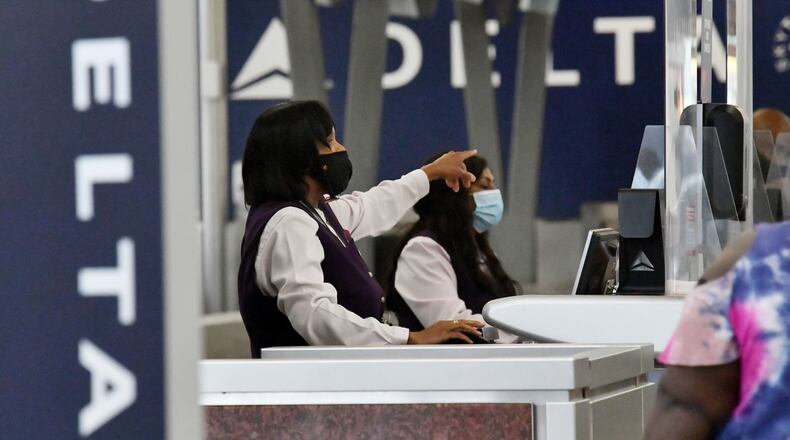After a brutal surge of COVID-19 cases in August and September fueled by the highly contagious delta variant, the number of cases and hospitalizations have plummeted.
While hopes are rising the worst is finally behind us, public health experts say Georgians shouldn’t let their guard down yet.
The number of COVID-19 patients in Georgia hospitals has plunged 68%, down to 1,962 Friday from a record high of 6,040 on Sept. 7. Over the next few weeks, that trend is likely to continue, according to the Centers for Disease Control and Prevention.
New cases have fallen sharply in recent weeks. The number of new confirmed and probable coronavirus cases has fallen 82% since Aug. 28.
Credit: Alyssa Pointer
Credit: Alyssa Pointer
Health care leaders expressed a bit of caution in their public messaging. Hospitalization numbers are still much higher than they were in late spring, before the highly contagious delta variant hit. And delta — or any other variant that is likely to come along — isn’t done with Georgia. There’s likely to be another wave, as seen repeatedly throughout the pandemic, and it could be accompanied by a winter flu season that could be worse than normal, they say.
Here’s a look at major developments related to COVID-19.
Vaccination levels remain low in Georgia
Georgia isn’t anywhere close to hitting the threshold that experts say is needed to curb the spread of the virus. Only about half of eligible Georgians are fully vaccinated, and research shows 65% to 70% of a population needs to be to prevent another wave of infection.
“There’s still a sizeable chunk, roughly 30% of the population in Georgia, that are sitting ducks for delta,’’ said Dr. Felipe Lobelo, an associate professor at Emory University School of Public Health. “This virus is just really good at ripping through the fabric of society and finding those people who are not vaccinated.”
Credit: HYOSUB SHIN / AJC
Credit: HYOSUB SHIN / AJC
Indeed, an overwhelming majority of patients who have landed in the hospital during the delta wave have not been vaccinated.
Among them: children not yet cleared to take a vaccine.
There’s yet another concern: People without timely access to a booster dose could become more susceptible to infection.
FDA panel endorses Moderna booster for some groups
A panel of outside experts advised the Food and Drug Administration to authorize a booster dose of Moderna vaccine for people 65 and over, adults with risk factors for severe COVID-19, and those whose jobs put that at high risk for serious complications of COVID-19, such as health care workers.
The FDA’s Vaccines and Related Biological Products Advisory Committee voted in favor of allowing booster doses at least six months after the second dose of the vaccine.
Pfizer booster shots were approved last month for the same groups of recipients. As of Thursday, Georgia had administered 114,502 booster shots, according to DPH.
Meanwhile, on Friday, the FDA panel endorsed booster doses of Johnson & Johnson’s single-shot COVID-19 vaccine, saying they should be offered at least two months after immunization.
Johnson & Johnson has asked the FDA for flexibility with its booster, arguing the extra dose adds important protection as early as two months after initial vaccination — but that it might work better if people wait until six months later.
The FDA’s advisers cited growing worried that recipients of J&J’s vaccination seem to be less protected than people who got two-dose Pfizer or Moderna options — and that most got that single-dose many months ago.
Georgia’s Department of Public Health said it will wait for final decisions by federal agencies before mobilizing to give out any boosters for recipients of the Moderna and the Johnson & Johnson vaccines, a spokeswoman said.
That final OK is not expected until next week at the earliest.
Work begins to prepare for vaccinations for children under 12
Georgia pediatricians are already preparing for parents’ questions if a COVID-19 vaccine for young children is authorized in the coming weeks.
Federal regulators expect at the end of this month to consider authorizing Pfizer’s COVID-19 vaccine for young children, from 5 to 11 years old.
Starting Wednesday, pediatricians can watch Georgia Department of Public Health webinars this month to learn more about the vaccine and the process for acquiring doses. One upcoming DPH webinar focuses on medical information about how the vaccines work, and how to discuss that information with patients and their parents.
Currently, only ages 12 and older can be vaccinated in the U.S., with shots made by Pfizer.
Delta says 90% of employees are now vaccinated
Delta Air Lines said 90% of its employees are now vaccinated against COVID-19, as the company continues its approach of financially penalizing workers who don’t get inoculated.
Credit: HYOSUB SHIN / AJC
Credit: HYOSUB SHIN / AJC
Rather than imposing a mandate for a vaccine, the Atlanta-based airline announced in August it would impose a monthly $200 health insurance surcharge on unvaccinated workers starting in November. They will also be required to take weekly COVID-19 tests and wear masks.
Other major U.S. airlines including United, American, and Southwest have required employees to get the shots.
Staff writers Yamil Berard, Willoughby Mariano, Kelly Yamanouchi and The Associated Press contributed to this report.
The Latest
Featured





